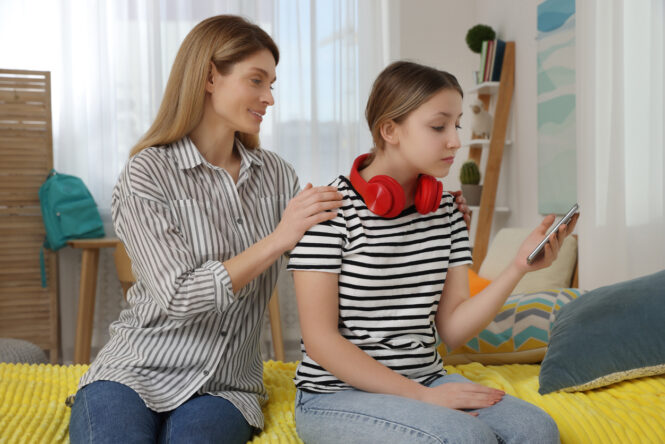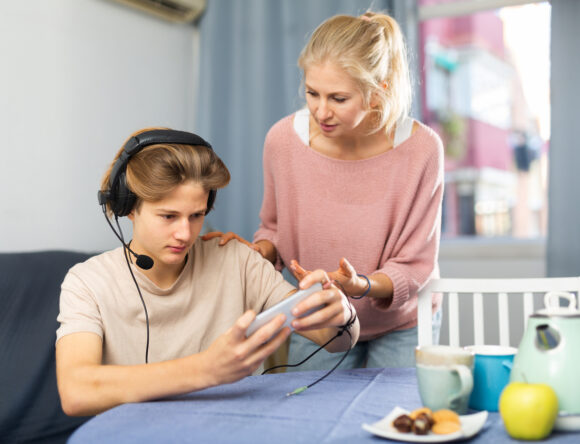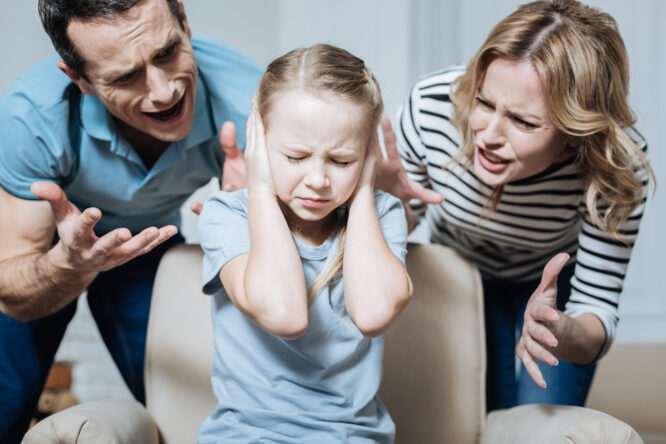Even when you’ve worked hard to parent differently, some of the things you grew up with can creep into how you treat your own adult kids.

Patterns don’t always repeat themselves in obvious ways. Sometimes they slip in under the radar, showing up as control, guilt, or silence where understanding could’ve been. It doesn’t mean you’re doing a bad job, by any means, but noticing the signs gives you a chance to change things before they settle into the same shape you once swore you’d break.
1. You catch yourself using the same phrases you hated growing up.

Maybe you swore you’d never say things like “Because I said so,” or “You’ll understand when you’re older,” yet those exact words slip out when you’re tired or frustrated. It happens fast, like muscle memory you didn’t know you had. These familiar phrases often come from a place of habit, not malice. Still, when they show up, they can make your adult child feel dismissed or unheard, just like you once felt.
2. You expect respect, but don’t always offer it in return.

Respect can turn into a one-way street if you’re not careful. If you’re quick to feel disrespected but slow to really listen to your adult child’s point of view, that dynamic mirrors the imbalance you might’ve experienced yourself. It’s easy to forget that adults, even if they’re your kids, deserve the same consideration you expect. Mutual respect means allowing space for disagreement without taking it personally.
3. You offer help that feels more like control.

You step in with advice, money, or solutions, thinking you’re being supportive. However, to your adult child, it might feel like micromanagement or a lack of trust in their ability to handle life. That pattern often echoes the kind of “help” you grew up with — the kind that came with strings, pressure, or silent judgement. Support should empower, not override their independence.
4. You struggle to see them as a separate adult.

It’s one thing to remember them as a child. It’s another to still treat them like one. If you catch yourself giving unsolicited instructions or correcting them like they’re 12 again, it’s a sign you haven’t fully updated your mental image of who they are now. Your parents may have done the same to you, keeping you locked in an outdated role. Letting your adult child grow in your mind helps you break that dynamic and connect as equals.
5. You avoid hard conversations the way your parents did.

If your own parents kept quiet about uncomfortable topics, you might find yourself doing the same, dodging talks about feelings, boundaries, or mistakes. Silence starts to feel safer than saying the wrong thing. However, avoiding those conversations usually leads to tension anyway. Facing things openly might feel unnatural, but it’s often what heals the rift before it grows.
6. You get hurt when they set boundaries.

Your adult child asks for space or says no to something, and it stings more than you expected. You might feel rejected, disrespected, or confused about what you did wrong. However, if you think about it, you may have felt the same way when you tried to set limits with your own parents. The challenge is learning to see their boundaries not as walls, but as honest signals of growth and self-care.
7. You use guilt to get your point across.

Comments like “I guess I’m just not important anymore” or “I did everything for you” might slip out when you feel overlooked. It’s not always intentional, but it lands heavily. That kind of emotional messaging mirrors the same guilt dynamics many people grew up with. It makes your adult child feel responsible for your emotions instead of free to share their own.
8. You prioritise your feelings over their autonomy.

When they make a decision you don’t agree with, your reaction becomes the centre of the story. You might pull away emotionally or make your discomfort the focus, even when it’s not really about you. This echoes patterns where your parents’ emotions overshadowed your needs. Reversing it means recognising when your response takes up space that should belong to their independence.
9. You expect regular contact without acknowledging their life stage.

You might feel hurt if they don’t call every week or update you constantly, but forget that they’re balancing their own responsibilities. Your parents may have expected the same, not realising how much it added to your mental load. Breaking the pattern means allowing connection to flow without pressure. Love doesn’t need constant proof to be real, and giving them room often brings them closer, not further away.
10. You downplay or dismiss their struggles.

It’s easy to slip into “You think that’s hard? Let me tell you about my twenties.” While it might come from a place of bonding or perspective, it can also sound like invalidation. If your own parents brushed off your challenges, you know how frustrating that felt. Repeating it, even calmly, builds a wall where empathy could have been.
11. You see their choices as a reflection of you.

When your adult child chooses something different—a lifestyle, belief, or path—you might feel like it’s personal. That they’re rejecting you by doing things their own way. This can mirror the pressure you felt to live up to your parents’ version of success. The truth is, your child’s choices aren’t about you; they’re about them stepping into who they are.
12. You rely on old hierarchies rather than mutual respect.

“I’m the parent” can still linger in your approach, even if they’re 30 and paying their own bills. You may expect obedience or deferment without realising how it shuts down open conversation. That top-down dynamic often mirrors how many people were raised—out of duty, not mutual understanding. True growth happens when you move from authority to mutual respect.
13. You withhold emotional openness because you weren’t shown it.

If you didn’t grow up in a house where people said “I’m proud of you” or “I love you no matter what,” those words can feel awkward to say, even when you mean them. However, just like you once needed to hear them, your adult child probably does too. Breaking the cycle starts with showing affection in the ways you might’ve gone without.
14. You react defensively when they bring up the past.

Hearing “That hurt me” from your adult child can feel like an attack, especially if you’ve done your best. But defensiveness can shut down important conversations and make them feel unsafe sharing anything real. If your parents responded to you the same way, you know how invalidating that feels. The change comes when you sit with their words, even if they’re uncomfortable, and respond with curiosity instead of guilt.
15. You rely on silence instead of repair when there’s tension.

After a disagreement, you might pull away instead of reaching out, hoping things smooth over on their own. That quiet distance can feel safer than addressing the issue, especially if you grew up with conflict avoidance. However, repair takes more than time. Owning your part, checking in, and expressing care helps rebuild trust, and prevents old patterns from becoming permanent rifts.
16. You want better for them, but you forget they might want different.

You have hopes, dreams, and advice, and it comes from love. Still, when your idea of “better” doesn’t match theirs, it can turn into subtle pressure to live your version of fulfilment. That’s often how generational cycles quietly persist. Breaking them means respecting not just their independence, but their right to define happiness on their own terms, even if it looks nothing like yours.




